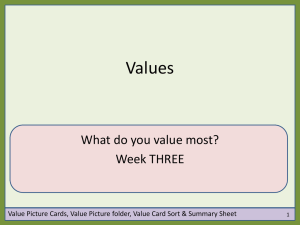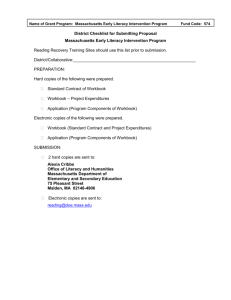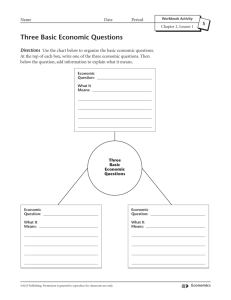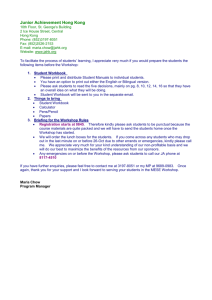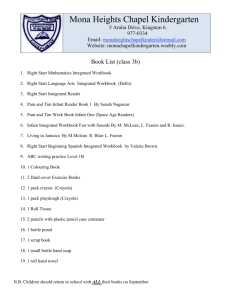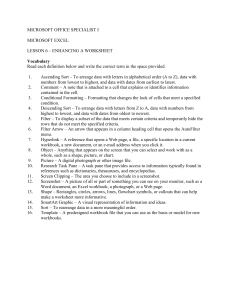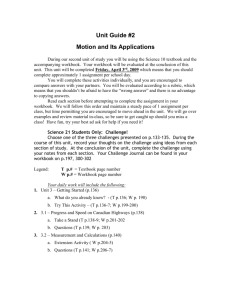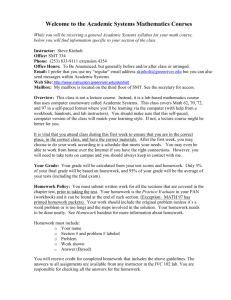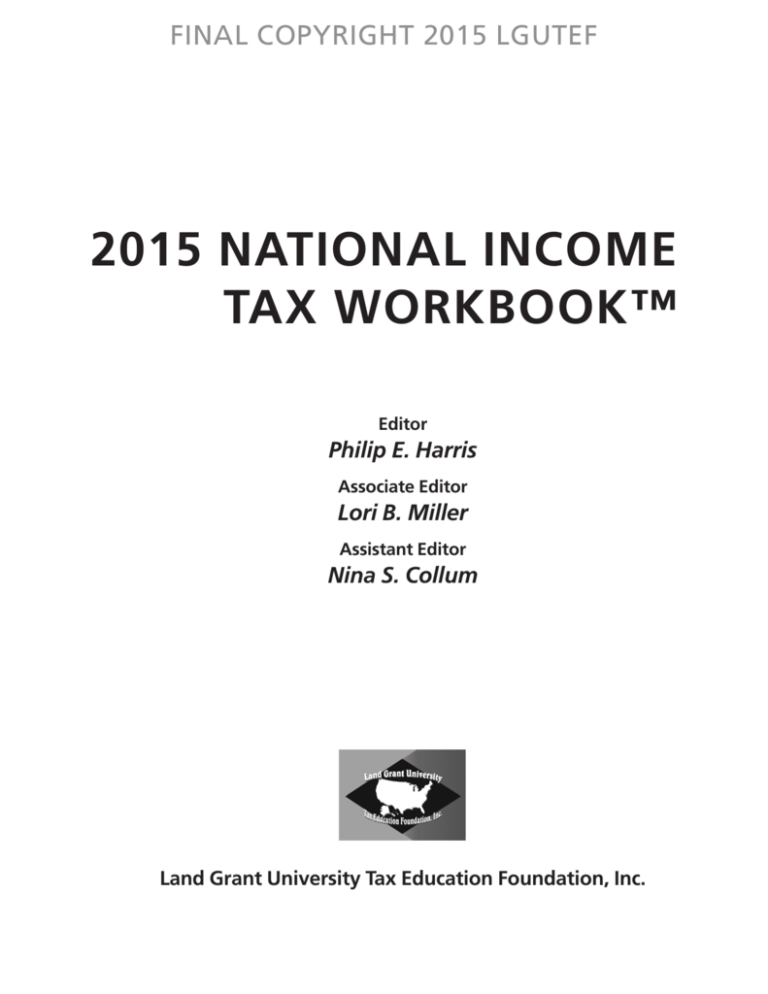
FINAL COPYRIGHT 2015 LGUTEF
2015 NATIONAL INCOME
TAX WORKBOOK™
Editor
Philip E. Harris
Associate Editor
Lori B. Miller
Assistant Editor
Nina S. Collum
Land Grant University Tax Education Foundation, Inc.
FINAL COPYRIGHT 2015 LGUTEF
2015 National Income
Tax Workbook™
Editor
©Copyright 2015 by Land Grant University Tax
Education Foundation, Inc.
Associate Editor
All rights reserved. No part of this book shall be
reproduced, stored in a retrieval system, or transmitted by any means, electronic, mechanical,
photocopying, recording, or otherwise, without
written permission from the publisher.
Land Grant University
Tax Education Foundation, Inc.
127 Young Rd.
Kelso, WA 98626
www.taxworkbook.com
Philip E. Harris
Lori B. Miller
Assistant Editor
Nina S. Collum
Managing Editor
Robert P. Achenbach, Jr.
Production Editor/Page Layout
Foti Kutil, Foti Publishing Solutions
Copy Editing
Gabriela Fulton
Printed in the United States of America
First Printing: October 2015
Warning and Disclaimer
This publication is distributed with the understanding that the authors, publisher, and distributor are not rendering legal, accounting, IRS, or
other professional advice or opinions on specific
facts or matters, and, accordingly, assume no
liability whatsoever in connection with its use or
with future rulings that may affect the material
presented. The information provided is for educational purposes only and nothing herein constitutes the provision of legal advice or services.
Indexer
Louise Toft
Project Assistant
Linda Davis
Printer
Davis Brothers Brothers Printing, Waco, TX
Land Grant University Tax Education
Foundation, Inc. Board of Directors and Officers
L. Leon Geyer, Chair
Guido van der Hoeven, President, Assistant
Treasurer
Robert P. Achenbach, Jr., CAO, Treasurer
Philip E. Harris, Vice President for Editorial
Services
Greg Bouchard, Vice President
Connie Smotek, Secretary, Director
Directors:
Clark Garland
C. Robert Holcomb
Virginia Uzendoski
William Klump
Corrections for all chapters and the 2015 National Income
Tax Workbook Update ( January 2016) are posted as they become
available at www.taxworkbook.com (user name: class2015;
password: class2015).
FINAL COPYRIGHT 2015 LGUTEF
CONTENTS
Introduction
Authors, Reviewers, and Contributors
viii
x
Land Grant University Tax Education
Foundation, Inc. (LGUTEF) Officers and Directors
xv
Cooperating Schools
xvi
CHAPTER 1
Tax Benefits Limited by Income
1
CHAPTER 2
Net Operating Losses
39
CHAPTER 3
Retirement Issues
71
CHAPTER 4
Trade or Business
109
CHAPTER 5
IRS Issues
139
CHAPTER 6
Business Issues
177
CHAPTER 7
Individual Taxpayer Issues
223
CHAPTER 8
Tax Accounting Issues
263
CHAPTER 9
Agricultural Issues
301
CHAPTER 10 Repair Regulations
349
CHAPTER 11 Affordable Care Act
411
CHAPTER 12 Business Entities
495
CHAPTER 13 Tax Practice
533
CHAPTER 14 New and Expiring Legislation
561
CHAPTER 15 Ethics
579
CHAPTER 16 Rulings and Cases
607
CHAPTER 17 Tax Rates and Useful Tables
685
Index
713
2016 Assistant Editor Job Opening
733
2016 Writing Competition
734
CD-ROM Instructions
735
FINAL COPYRIGHT 2015 LGUTEF
INTRODUCTION
Although 2015 was a relatively quiet year for tax legislation, there are still a lot of new rules to learn
for filing 2015 federal income tax returns. The “Affordable Care Act” chapter focuses on the employer
mandate, which is effective for the first time in 2015 but has some transition rules that phase in the application of some of the provisions. The chapter also reviews the mandate that individuals have minimum
essential coverage or pay a penalty unless they qualify for an exemption. The premium tax credit helps
pay the cost of health care insurance for some individuals. The chapter also provides guidance on the
information reporting requirements that start in the 2015 calendar year.
The “Repair Regulations” chapter updates last year’s explanation based on new guidance from
the IRS. Rulings from the IRS confirm that regulations primarily codified and clarified existing law,
which means that most taxpayers do not have a change in method of accounting when they follow the
regulations.
The “New and Expiring Legislation” chapter discusses the retroactive extension of over 50 provisions that expired at the end of 2013—and they expired again at the end of 2014. Although Congress is
likely to extend most of them, taxpayers will have to wait until the president signs legislation to know if
any are not extended and the details for those that are extended. The president did sign some tax legislation in 2015. Higher penalties will apply to late, inaccurate, or unfiled information returns for tax years
beginning after December 31, 2015, which will affect information returns filed in 2017 and after. Other
legislation changed filing due dates for partnership, C corporation, and other returns; clarified basis
rules; and imposed a new requirement that executors of decedents’ estates report the basis of assets in
the estate to the beneficiaries.
The “Tax Benefits Limited by Income” chapter compares the phaseout ranges for several income
tax provisions that are affected by the taxpayer’s level of income. Each of those provisions affects the
taxpayer’s effective marginal tax rate because an additional dollar of income not only increases taxable
income by one dollar but may also decrease a deduction, which further increases income. Similarly, an
additional dollar of income may decrease tax credits that are affected by the amount of income.
The “Individual Taxpayer Issues” chapter explains who can claim the home mortgage interest
deduction, and it discusses new rules for calculating gain or loss from playing slot machines. It also
explains itemized deductions for sales tax, and the allocation of property deductions between a buyer
and a seller. The chapter provides information about applying for innocent spouse relief, and it reviews
the requirements for gift tax return filing. It discusses basis and holding period rules for asset transfers,
and strategies for estate planning with the deceased spousal unused exclusion (DSUE).
The “Retirement Issues” chapter includes checklists to facilitate compliance with the requirements
of various types of retirement plans, and it explains the tax treatment of nonqualified annuities. It also
reviews the tax treatment of net unrealized appreciation in employer securities, and it compares and
contrasts the tax implications of a business sale structured as a stock sale and a business sale structured
as an asset sale.
The “IRS Issues” chapter discusses options for taxpayers who have not complied with requirements
for reporting of foreign investments, and it describes how the IRS investigates and assesses penalties in
trust fund recovery cases. It explains how and when to use the new Form 1023-EZ, which streamlines
the application for tax-exempt status from 26 pages to 3 pages.
The “Ethics” chapter discusses tax practitioners’ ethical responsibilities and reviews several provisions (both old and new) of Treasury Department Circular 230, Regulations Governing Practice before the
viii FINAL COPYRIGHT 2015 LGUTEF
Internal Revenue Service. It includes a review of challenges to the IRS’s ability to regulate tax return preparers, and numerous examples and case studies illustrate how the ethical rules and regulations apply to
everyday tax practice.
The “Tax Practice” chapter explains recoveries and the tax benefit rule, and the taxation of damage
awards. It provides an overview of appealing a case to the United States Tax Court, and it discusses e-file
authentication requirements and some significant concerns that the requirements will require disclosure
of private information and will compromise the trusted relationship between the tax practitioner and his
or her client. The chapter also details alternate payment methods for clients who owe taxes, including
the recent expansion of the business online payment agreement.
Calculating and reporting a net operating loss (NOL) can be complex. The “Net Operating Losses”
chapter describes when a taxpayer can carry an NOL to another year, and how the NOL is computed.
It also details ways to use NOLs to maximize tax benefits.
Three chapters look at issues that significantly impact business taxpayers:
1.The “Business Entities” chapter explains cancellation of debt (COD) income and some key exceptions that allow a taxpayer to exclude COD income. It also includes a review of the allocation of
partnership liabilities and some common tax issues faced by limited liability companies.
2.The “Business Issues” chapter includes strategies for grouping activities to minimize net investment
income tax, an updated review of business travel and car and truck expenses, and new requirements
for reporting payment card and third-party network transactions on Form 1099-K. It also describes
the large impact that common control has on tax and benefit treatment, including consolidated
return filing, rate structures, the ability to use certain deductions and credits, and employer requirements under the Affordable Care Act.
3.The “Trade or Business” chapter distinguishes between a trade or business and an investment or
hobby activity. It provides a summary of key cases that illustrate when the self-employment tax
applies. The chapter also looks at the definition of a trade or business in the context of emerging
businesses models such as Uber and Lyft.
The “Agricultural Issues” chapter discusses reporting gain or loss from the sale of livestock, and net
investment income tax problems to look out for when retiring and transferring the family farm to the
next generation. It explains how to report income and deductions for landowners who receive payments
for oil and gas on their property, and it details the tax implications of revoking an election to report a
Commodity Credit Corporation (CCC) loan as income.
The “Tax Accounting Issues” chapter examines how to choose a method of accounting and how to
change that method of accounting, including changes necessitated by depreciation errors. It describes
tax accounting requirements for cost of goods sold and inventory, and specialized tax accounting treatment for soil and water conservation expenses and employee tips.
As always, the “Rulings and Cases” chapter summarizes court cases, new regulations, and IRS pronouncements that have been published since the 2014 book.
The value of this book as a resource for information throughout the year is enhanced by the “Tax
Rates and Useful Tables” chapter, which provides a quick reference for the 2014, 2015, and 2016 tax
years (to the extent that 2016 information is available).
The Land Grant University Tax Education Foundation, Inc. is pleased to provide this book to about
29,000 tax practitioners in tax schools taught in 32 states.
Philip E. Harris
Lori B. Miller
Nina S. Collum
Editors
ix
FINAL COPYRIGHT 2015 LGUTEF
Authors
PHILIP E. HARRIS
Philip E. Harris, JD, is a professor in the Department of Agricultural and Applied Economics at
the University of Wisconsin-Madison/Extension,
where he researches and teaches farm tax and
business planning. Phil coauthored chapters of the
Farm Income Tax Workbook from 1980 through 1998,
when he became the lead author and editor of that
book. He has been the lead author and editor of
the National Income Tax Workbook since 2002. He has
coauthored the majority of the chapters of the 2015
National Income Tax Workbook.
LORI B. MILLER
Lori B. Miller, JD, LLM in taxation, is an attorney in
Whitefish, Montana. She is also licensed to practice
in California and Washington. Her legal practice
emphasizes tax law, estate planning, and business
law. She has been writing for legal publications and
editing national and international legal and tax treatises for over 8 years. She is the associate editor of
the 2015 National Income Tax Workbook. She wrote
most of the “Tax Accounting Issues” chapter for the
2015 National Income Tax Workbook and coauthored
several other chapters.
NINA S. COLLUM
Nina S. Collum, CPA, is an assistant professor in
the School of Accountancy at Louisiana Tech
University. She has previously written chapters
on automobiles, construction contractors, natural
resources, alternative minimum tax, recapture, real
estate issues, divorce, estate and gift taxes, trade or
business, and related-party issues, and has assisted
in the workbook editing process since 2005. Nina is
the assistant editor of the 2015 National Income Tax
Workbook.
ROBERT P. ACHENBACH, JR.
Robert Achenbach, JD, is the chief administrative
officer of the Land Grant University Tax Education Foundation (LGUTEF) and co-owner of the
Agricultural Law Press, working as the publisher,
writer, and editor of the biweekly newsletter Agricultural Law Digest; the Agricultural Law Manual;
and Farm Estate and Business Planning. Robert has
been a writer and editor for the 14-volume treatise,
Harl, Agricultural Law (Matthew Bender), for over
33 years. He wrote the “Rulings and Cases” chapter
of the 2015 National Income Tax Workbook.
SETH E. ANDERSON
Seth E. Anderson is in private practice as principal of Birch Tree Tax, LLC, located in Shelburne,
Vermont. His practice focuses on the areas of
individual tax preparation, business tax preparation, and financial analysis/planning for individuals and small businesses. He is an enrolled agent
and co-coordinator of the University of Vermont
x Extension Income Tax Schools. Seth was one of the
authors for the “Tax Accounting Issues” chapter for
the 2015 National Income Tax Workbook.
CHARLES BARRINGTON
Charles Barrington is an enrolled agent and owner
of Barrington Tax and Financial Services, LLC in
South Bend, Indiana. He currently serves as a board
member of the Indiana Tax Practitioners Association and has been an instructor for the Purdue University Income Tax Schools since 2002. He retired
from the IRS in 2011 after a 33-year career holding
positions of tax auditor, revenue officer, supervisory
revenue officer, and senior stakeholder liaison. During the last 8 years of his tenure as a senior stakeholder liaison, he served five states in the Midwest
as the subject matter expert (SME) for offer-in-compromise presentations to tax professional groups
and organizations. Charles wrote the “Tax Practice”
chapter for the 2015 National Income Tax Workbook.
GREGORY J. BOUCHARD
Gregory J. Bouchard is the director of the Cornell
University income tax schools. He is a senior business consultant for Farm Credit East, ACA, where
he is responsible for tax training as well as consulting directly with clients regarding their estate and
business plans. Farm Credit is a major provider of
tax services, and Greg’s specialty is partnership taxation. He has been an instructor for the New York
State Income Tax Schools for the last 17 years. Greg
is a contributor to the “Business Issues,” “Agricultural Issues,” and “Individual Issues” chapters and
reviewed the “Net Operating Losses” chapter for
the 2015 National Income Tax Workbook.
MARK D. BURCH
Mark D. Burch is an enrolled agent and managing principal of Burch & Associates, Inc., located
in Lincoln, Nebraska. His practice focuses on local
and regional small businesses and individual tax
preparation and representation. He is an instructor
for the University of Nebraska Tax Institute and a
board member of the Nebraska Society of Independent Accountants. Mark contributed to the “Ethics”
chapter for the 2015 National Income Tax Workbook.
CHARLES CUYKENDALL
Charles Cuykendall is retired from Cornell University in Ithaca, New York, where he was the income
tax educational program director. He has been an
instructor at the New York Income Tax Schools for
the past 19 years. He specializes in tax law pertaining to small businesses and agriculture. Charlie is
the author of the “Tax Rates and Useful Tables”
chapter of the 2015 National Income Tax Workbook.
He has also reviewed all the chapters of this book
for mathematical accuracy.
FINAL COPYRIGHT 2015 LGUTEF
THEODORE A. FEITSHANS
Theodore A. Feitshans, JD, is an Extension professor in the Department of Agricultural and Resource
Economics at North Carolina State University. Ted
has authored or coauthored chapters of the Farm
Income Tax Workbook from 2004 through 2010. He
teaches courses in agricultural law and environmental law in the department’s undergraduate program
and estate planning and farm transition in the North
Carolina Cooperative Extension program. Ted is
the author of the “Trade or Business” chapter for
the 2015 National Income Tax Workbook.
C. ROBERT HOLCOMB
Rob Holcomb is an enrolled agent who has been
an extension educator with the University of Minnesota since 2004. Rob works on the development
and delivery of educational programs in the area
of agricultural risk management, with emphasis on
farm analysis, business planning, and taxation. Rob
has been an instructor for the Minnesota Income
Tax Short Course since 2010, and in 2011 he began
serving as the tax school faculty director. Rob contributed one of the issues in the “Agricultural Issues”
chapter and reviewed the remaining issues of the
“Agricultural Issues” chapter for the 2015 National
Income Tax Workbook.
ROBERT W. JAMISON
Robert W. Jamison, CPA, MBA, PhD, is a professor emeritus of accounting in the Kelley School of
Business at Indiana University–Indianapolis. He is
also the author of S Corporation Taxation and a coauthor of Multistate Tax Guide to Pass-Through Entities,
both published annually by CCH, Inc. He operates a consulting and continuing education practice
from his home in Leesburg, Virginia, specializing
in S corporations and other closely held businesses.
Since 1987 Bob has contributed his knowledge of
S corporations, C corporations, partnerships, and
limited liability companies to several editions of this
book. He wrote the “Business Entities” chapter and
contributed to the “Business Issues” chapter of the
2015 National Income Tax Workbook.
LEXIE JOHNSON
Lexie Johnson is a May 2015 graduate of William
Mitchell College of Law in St. Paul, Minnesota,
where she focused her studies on tax law and criminal law. Lexie contributed to the “Business Issues”
chapter for the 2015 National Income Tax Workbook.
WILLIAM T. KRIESEL
William T. Kriesel, CPA/PFS, CFP®, AEP®, is
partner-in-charge: financial planning in the Syracuse, New York, firm Bowers & Company, CPAs,
PLLC. Bill has been a presenter on many tax topics, particularly as related to partnership taxation
and advanced asset transfer techniques. He has
authored three published articles, each appearing
in the CPA Journal. He has been a reviewer and
author in previous years for the National Income Tax
Workbook, and he wrote an issue for the “Retirement
Issues” chapter and reviewed the remainder of the
“Retirement Issues” chapter for the 2015 National
Income Tax Workbook.
MARY OLSON
Mary Olson, an enrolled agent, has been a tax professional for more than 40 years. She is the regional
manager of The Iola Tax Place in Iola, Wisconsin,
and also works remotely as an Intuit TurboTax
adviser. Previously, she was a tax research specialist for the National Association of Tax Professionals
(NATP), where she researched and responded to
questions from other tax professionals in addition
to writing many articles and continuing education
books, and conducting webinars. Mary previously
worked for the IRS in Indianapolis and was an
instructor for the Purdue University Farm Schools.
Mary is the author of the “IRS Issues” chapter of the
2015 National Income Tax Workbook.
NORMAN A. PROVVIDENZA
Norman A. Provvidenza, CPA, is cofounder and a
managing member of Provvidenza & Wright CPAs,
LLC, located in Pittsford, New York, a provider
of financial, tax and advisory services to the small
and medium market. He has more than 20 years of
experience in providing personalized financial, tax,
and advisory services to closely held businesses and
their owners, specializing in the agriculture, medical, real estate, and construction industries. He is
an alumnus of the Leadership Academy of the New
York State Society of CPAs and is a member of the
American Institute of CPAs and New York State
Society of CPAs. Norm wrote the “New Repair
Regulations” chapter of the 2015 National Income
Tax Workbook.
PATRICIA UGOROWSKI
Trish Ugorowski retired from the IRS in 2012.
During the last 5 years before her retirement, she
served as a Large Business and International (LB&I)
partnership technical adviser, providing guidance
to IRS employees on partnership, passive activity,
and at-risk issues. Throughout her career Trish was
involved in training development and delivery for
the IRS, the Michigan State University Tax Schools,
and Lansing Community College. She is currently
an enrolled agent. Trish is the author of the “Affordable Care Act” chapter and reviewed the “Repair
Regulations” chapter for the 2015 National Income
Tax Workbook.
LINDA YODER
Linda Yoder is a retired IRS revenue agent. She is
now an enrolled agent and a certified financial planner (CFP®), residing in Rossville, Indiana. She has
taught for the Purdue University Tax Schools for 25
years and has previously written chapters on retirement, ethics, education, exempt organizations, and
xi
FINAL COPYRIGHT 2015 LGUTEF
individual taxpayer issues. Linda is president of the
Indiana Tax Practitioners Association. She wrote
the “Tax Benefits Limited by Income” chapter
and most of the “Individual Taxpayer Issues” and
“Retirement Issues” chapters for the 2015 National
Income Tax Workbook.
Reviewers
KARI A. APEL
Kari A. Apel, CPA, is the CEO and owner of Apel
Associates, Inc.; Apel CPAs & Consultants, LLC;
and Wrensch Apel Associates, LLC of Prairie du
Sac, Baraboo, and Johnson Creek, Wisconsin,
respectively. Kari has coauthored and edited several tax and accounting publications including the
U.S. Department of Agriculture Farm Tax Management publication. Currently she serves on many
advisory boards, including her local Chamber of
Commerce and Economic Development Committee. Kari specializes in small business and agricultural management from tax law to strategic business
planning. Kari reviewed the “Affordable Care Act”
and “Tax Accounting Issues” chapters for the 2015
National Income Tax Workbook.
CHRIS BIRD
Chris Bird is a national lecturer on individual
income, corporate income, and real estate tax
issues. His background includes more than 17 years
of experience as an IRS agent in St. Louis, Missouri,
and Springfield, Illinois, serving as a field agent,
a branch manager, and a training director. He is
a certified financial planner and was an enrolled
agent for more than 20 years. Chris has taught preparation courses for the registered tax return preparer and the enrolled agent examinations as well
as courses on the Affordable Care Act. Chris previously was a contributor to the University of Illinois
Tax School workbook and an instructor at their
seminars throughout Illinois. He uses the National
Income Tax Workbook to conduct seminars involving more than 1,600 participants annually. Chris
reviewed the “Repair Regulations” and “New and
Expiring Legislation” chapters for the 2015 National
Income Tax Workbook.
CHRIS BIXBY
Chris Bixby is a senior financial planner for Key
Private Bank in Bellevue, Washington. Prior to joining Key Bank, he was a private practitioner serving
the tax and planning needs of more than 400 households. He has been an instructor for the University
of Vermont Income Tax Schools and travels extensively teaching tax review courses. He is a certified
financial planner, an enrolled agent, and a chartered
life underwriter. Chris reviewed the “Retirement”
chapter of the 2015 National Income Tax Workbook.
xii LARRY BORTON
Larry Borton is the manager of the Michigan State
University (MSU) Telfarm Center and is the coordinator of the MSU Tax School for the Department
of Agricultural, Food, and Resource Economics.
He specializes in agricultural economics and agricultural engineering. Larry reviewed the “Business
Issues” chapter of the 2015 National Income Tax
Workbook.
THEARON EAREGOOD
Thearon Earegood is a retired IRS agent and former instructor of the Michigan State University
Income Tax Schools. He has instructed numerous
tax classes for the IRS in income tax law pertaining
to individuals, corporations, and partnerships. He
served as an on-the-job instructor for many employees and also was a course developer. Thearon has
been involved in writing and reviewing the National
Income Tax Workbook and its predecessor since 1976.
He reviewed the “Tax Benefits Limited by Income”
chapter for the 2015 National Income Tax Workbook.
L. LEON GEYER
Leon Geyer is a professor of agricultural and environmental law at Virginia Tech. He has been the
director of the Virginia Tech Income Tax Schools
for 21 years and teaches the farm tax section in the
schools. He has both written and reviewed chapters for the National Income Tax Workbook in the past.
Leon reviewed the “Ethics” chapter of the 2015
National Income Tax Workbook.
MIKE L. HARDIN
Mike L. Hardin, PhD, enrolled agent, and president of Tax Visions, Inc., a tax practice in Stillwater, Oklahoma, is a former professor and extension
tax specialist at Oklahoma State University. His
tax law specialties include small businesses, entity
planning, financial and retirement planning, and
financial distress. He has been an instructor for tax
schools in Oklahoma for 30 years and in Missouri
for 21 years. Mike has participated in planning and
editing income tax workbooks since 1983 and has
been an author and reviewer for many editions of
this book. He reviewed the “Trade or Business” and
“IRS Issues” chapters for the 2015 National Income
Tax Workbook.
WILLIAM R. KLUMP
William R. Klump is a CPA and president of Klump
& Blandford, PSC, a CPA firm located in Louisville,
FINAL COPYRIGHT 2015 LGUTEF
Kentucky. His practice is primarily devoted to federal and Kentucky state income taxes. He has been
an instructor for the income tax schools sponsored
by the University of Kentucky since 1997. Bill has
participated in editing sessions for the National
Income Tax Workbook for 10 years. He reviewed
the “Business Issues” chapter for the 2015 National
Income Tax Workbook.
RUTH ANN MICHNAY
Ruth Ann Michnay, CPA, MBT, an enrolled agent,
and a United States Tax Court practitioner, has
a practice in St. Paul, Minnesota, where she concentrates in tax representation, tax preparation
(individual and small businesses), and accounting
services/consulting. She serves on the American
Institute of CPAs’s Advocacy & Relations Committee (formerly IRS Practice and Procedures Committee, 2012–2015 and 2004–2007) and has published
articles in The Tax Adviser. Ruth Ann teaches for the
University of Minnesota Income Tax Course and
is an adjunct faculty member at Metropolitan State
University and Century College. She reviewed the
“Individual Taxpayer Issues,” “Tax Accounting
Issues,” and “New and Expiring Legislation” chapters for the 2015 National Income Tax Workbook.
EDITH F. MOATES
Edith F. Moates, CPA, JD, retired from the IRS
in 2006 and is in private practice with Moates &
Associates, a tax-oriented legal and accounting
firm located in Norman, Oklahoma. She represents
numerous clients before the IRS Appeals Office and
the U.S. Tax Court. She has instructed the Oklahoma State University Tax Institutes since 1985
and has edited and reviewed numerous income tax
chapters over the years. Edith reviewed the “Ethics”
chapter of the 2015 National Income Tax Workbook.
DIANNE M. NICHOLS
Dianne M. Nichols retired from the IRS as a revenue agent in the small business/self-employed
division, specializing in employment taxes and
general examination. She is now an enrolled agent
working as a consultant for small businesses on tax
compliance issues. Dianne is also actively involved
with representing individuals at IRS office and field
audits. She has recently retired as an instructor at
the Ohio State University Income Tax School after
more than 16 years. Dianne reviewed the “Individual Taxpayer Issues” and “IRS Issues” chapters for
the 2015 National Income Tax Workbook.
GEORGE F. PATRICK
George F. Patrick is a professor emeritus and extension economist for the Department of Agricultural
Economics at Purdue University in West Lafayette,
Indiana. He has been an instructor at the Purdue
income tax schools and at the Purdue Agricultural
Tax Workshop for over 20 years. George has been
involved in writing and reviewing chapters for the
National Income Tax Workbook and its predecessor for
more than 30 years. He reviewed the “Agricultural
Issues” chapter for the 2015 National Income Tax
Workbook.
MARY LOU PRUDEN
Mary Lou Pruden is a retired revenue agent, appeals
officer, and resident lead instructor for IRS examination personnel. She served as a course developer for numerous training courses while detailed
to the IRS’s National Office. Following her retirement Mary Lou opened her own tax practice and
has been an instructor for the University of Kentucky Income Tax Schools since 2002. Mary Lou
reviewed the “Tax Practice” and “Business Entities”
chapters for the 2015 National Income Tax Workbook.
F. JOHN SCHIFFERLI
F. John Schifferli is a principal with Provvidenza &
Wright, CPAs, in Pittsford, New York. He has been
with Cornell University’s In-Depth Tax School, one
of New York State’s largest tax schools, for the past
28 years, and is the senior instructor. John specializes in trusts and estates. He reviewed the “Business
Entities” chapter of the 2015 National Income Tax
Workbook.
SUSAN SCIOLI
Susan Scioli is an enrolled agent and a principal of
Scioli & Associates, PC, a tax firm specializing in
compliance representation and advocacy in Saginaw, Michigan, and Muncie, Indiana. Susan worked
for the IRS as a senior tax specialist in the education
division for 11 years. She has been an instructor
at the income tax schools sponsored by Michigan
State University for 15 years and at Cornell University for 5 years and now teaches around the country.
Susan reviewed the “Tax Practice” and “Affordable
Care Act” chapters for the 2015 National Income Tax
Workbook.
VICTORIA SNYDER
Victoria Snyder, CPA, MSA, works in the tax
department of Katz, Sapper & Miller in Indianapolis. Before becoming an accountant, she worked in
the newspaper industry for 12 years as a copy editor and section editor. Victoria edited the “Business
Entities” chapter of the 2015 National Income Tax
Workbook.
GUIDO VAN DER HOEVEN
Guido van der Hoeven is an extension specialist/
senior lecturer for the Department of Agricultural
and Resource Economics at North Carolina State
University in Raleigh. He is also the director of
the North Carolina income tax schools. He has
instructed in the 2-day intermediate tax school, as
well as in several 8-hour introductory and agricultural tax programs, across North Carolina and six
other states. Guido reviewed the “Net Operating
Losses” and “Agricultural Issues” chapters for the
2015 National Income Tax Workbook.
xiii
FINAL COPYRIGHT 2015 LGUTEF
ELLEN L. WALZ
Ellen L. Walz has worked for Southwest Accounting, Inc. in Lancaster, Wisconsin, since 1994. She
is an enrolled agent and specializes in partnership income taxes and information returns. Ellen
reviewed the “Tax Practice” chapter of the 2015
National Income Tax Workbook.
SHIRLEY A. WOFFORD
Shirley A. Wofford is a CPA and attorney who
retired from the IRS in 2005. Her career experience
included classroom instructor, on-the-job instructor,
group manager, corporate audit team coordinator,
senior team coordinator, and member of various
task forces in the IRS National Office. She currently
has a limited legal and accounting practice and represents clients before the IRS in US district courts
and the US Tax Court. She also works part-time
for Gates Winden & Associates, PC in Tulsa, Oklahoma. She has been an instructor for the Oklahoma
State University Tax Schools since 2011. Shirley
reviewed the “Trade or Business” chapter for the
2015 National Income Tax Workbook.
Contributors
KENNETH WUNDROW
Ken Wundrow has worked with the firm of Mennenga Tax & Financial Service in Madison, Wisconsin, since 1998, when he merged his private
practice with that of the firm. Ken offers both tax
preparation and financial planning for his clients.
Ken also serves as the financial manager for the firm
and conducts numerous tax and financial seminars
throughout the year. Ken reviewed the chapters on
“Retirement Issues” and “Tax Benefits Limited by
Income” for the 2015 National Income Tax Workbook.
CLARK D. GARLAND
Clark D. Garland is professor emeritus in the Agricultural and Resource Economics Department
at the University of Tennessee. Prior to his retirement in 2011, he served on the University of Tennessee faculty for 40 years with responsibilities in
extension, specializing in agricultural finance. He
has been director of the University of Tennessee
Income Tax Seminars for more than 20 years.
LARRY GEARHARDT
Larry Gearhardt, JD, is currently a field specialist in taxation in the College of Food, Agriculture,
and Environmental Sciences Extension at the Ohio
State University. He serves as the director of the
Ohio State University Tax Schools and is an assistant professor. Before coming to OSU Extension,
Larry worked for more than 20 years at the Ohio
Farm Bureau. He most recently served as the senior
director of legal and local affairs and was the director of state legislative affairs for several years. He is
the past chairman of the Agricultural Law Committee of the Ohio State Bar Association.
J C. HOBBS
J C. Hobbs is an assistant extension specialist for
the Department of Agricultural Economics at Oklahoma State University. He coordinates as well as
teaches agriculture tax issues for the Oklahoma
State Farm and Business Tax Institutes. His areas
of interest include farm management and income
tax issues.
xiv MARY JANE HOURANI
Mary Jane Hourani is an enrolled agent for the
IRS and is a National Tax Practice Institute fellow.
She has a tax and accounting practice in Brighton,
Michigan, specializing in small business. Mary Jane
is an instructor for the Michigan State University
Tax School.
JOHN JONES
John Jones is a faculty member of the Department
of Agricultural, Food, and Resource Economics at
Michigan State University. His work concentrates
on the capture and analysis of farm management
data used in the agricultural sector and works
directly with the MSU Telfarm Program, assisting
MSU-Extension agents and farm managers in the
areas of farm records, farm and income tax management, economic intelligence, and on-farm
issues of information system design.
MARK RIBAS
Mark Ribas has been employed by the IRS since
1974 and is currently a revenue agent assigned to
the Large Business and International Division,
where he conducts examinations of large corporations and partnerships. Mark is a CPA and has
served as an adjunct professor of accounting for
Fairmont State University for several years. During
the past 16 years, he has served as an instructor at
the Virginia Tech, Texas A&M, and West Virginia
University income tax schools. Mark currently is
the president as well as an instructor for Pennsylvania Tax Institutes, Inc., which conducts income
tax seminars throughout the State of Pennsylvania.
CLAIRE TWARDY
Claire Twardy is a senior program developer in the
Office of Professional & Continuing Education at
Auburn University. She plans and facilitates numerous programs, courses, and conferences throughout
the year. She began working with the Land Grant
University Tax Education Foundation in 2007,
when she assumed responsibility for the Auburn
University Accounting & Tax Training Institute
tax professional seminars in the States of Alabama,
Arkansas, Georgia, Louisiana, and Nevada.
FINAL COPYRIGHT 2015 LGUTEF
VIRGINIA UZENDOSKI
Virginia Uzendoski is the senior assistant director
of programs & conferences–executive education,
College of Business Administration at the University of Nebraska–Lincoln. She oversees the development and management of distance learning
professional education programs/conferences and
continuing education accreditation standards, policies, and procedures. She began working with the
Land Grant University Tax Education Foundation
in 2009, when she assumed responsibility for the
Nebraska Federal & State Income Tax Institutes,
with sites across the state of Nebraska, now in its
sixty-first year.
CAROL GREGORY WRIGHT
Carol Gregory Wright, CPA, lectures on partnership taxation in various locations. Her IRS career
spanned 36 years, from tax auditor to revenue agent.
In addition to conducting audits, Carol taught all
phases of IRS classes. She developed courses for
various topics for the IRS and served as the training
coordinator for partnerships and tax shelters. She
taught the Michigan State University’s Income Tax
Schools for 9 years in the 1980s and since her retirement in 2009.
Land Grant University Tax Education Foundation, Inc.
Officers and Directors
L. Leon Geyer, Chair
Department of Agricultural and Applied
Economics
206B Hutchinson Hall
Blacksburg, VA 24061
phone: 540.231.4528, fax: 540.231.7417
geyer@vt.edu
Guido van der Hoeven,
President, Assistant Treasurer
Nelson Hall, Room 3308
North Carolina State University
Raleigh, NC 27695-8109
phone: 919.515.9071, fax: 919.515.6268
guido_vdh@ncsu.edu
Robert P. Achenbach, Jr.,
Chief Adminstrative Officer/Treasurer
127 Young Road
Kelso, WA 98626
phone: 360.200.5458, fax: 360.423.2287
Robert@taxworkbook.com
Philip E. Harris, Vice President
for Editorial Services
University of Wisconsin–Madison
Department of Agricultural and Applied
Economics
427 Lorch St., Room 517
Madison, WI 53706
phone: 608.262.9490, fax: 608.265.7890
peharris@wisc.edu
Greg Bouchard, Vice President
for Administration, Director
Connie Smotek, Secretary, Director
Texas Extension Education Foundation, Inc.
PO Box 946
College Station, TX 77843
phone: 979.845.2226, fax: 765.494.4241
csmotek@tamu.edu
Virginia Uzendoski, Director
Tax Institute
1320 Q St.
Lincoln, NE 68588
phone: 402.472.9334, fax: 402.472.6278
virginia@unl.edu
William Klump, Director
1300 Gardiner Lane Suite 9
Louisville, KY 40213
phone: 502.479.8540, fax: 502.479.8542
mklumpco@bellsouth.net
Clark Garland, Director
University of Tennessee
314 Morgan Hall
2621 Morgan Circle
Knoxville, TN 37996
phone: 865.974.7412, fax: 865.974.9492
cgarland@utk.edu
C. Robert Holcomb, Director
University of Minnesota Extension
1424 E. College Dr., Suite 100
Marshall, MN 56258
phone: 507.337.2807, fax: 507.337.2802
holcombr@umn.edu
Cornell University
2676 County Road 47
Canandaigua, NY 14424
phone: 607.254.5102, fax: 607.255.1589
gregory.bouchard@cornell.edu
xv
FINAL COPYRIGHT 2015 LGUTEF
COOPERATING SCHOOLS 2015 National Income Tax Workbook™
Coordinators: Cooperating States
Alabama/Arkansas/Florida/Louisiana/Nevada
North Carolina
Claire Twardy–Outreach Program Office,
Auburn University, Auburn, Alabama
Guido van der Hoeven–Department of Agricultural and Resource Economics, North Carolina
State University, Raleigh, North Carolina
Georgia
Tifton Roger Roemmich–ROKA Wealth Strategists, LLC, Atlanta, Georgia
Illinois
Tom Muldoon–TaxSeminars.com, Niles, Illinois
Indiana
Michael Langemeier–Department of Agricultural Economics, Purdue University, West Lafayette, Indiana
Kentucky
Dr. Steve Isaacs–Department of Agricultural
Economics, University of Kentucky, Lexington,
Kentucky
Ohio
Larry Gearhardt–OSU Extension, The Ohio
State University, Columbus, Ohio
Bill Van Lokeren–College of Business, University of Cincinnati, Cincinnati, Ohio
Oklahoma
JC. Hobbs–Cooperative Extension Service, Agricultural Economics Department, Oklahoma State
University, Stillwater, Oklahoma
Oregon
Massachusetts
Carmen Schwisow–Professional Development
Center Portland State University, Portland,
Oregon
M.J. Alhabeeb–Department of Resource Economics, University of Massachusetts, Amherst,
Masssachsetts
Pennsylvania /Delaware/New Jersey
Mark Ribas–Pennsylvania Tax Institutes, Inc.,
State College, Pennsylvania
Michigan
South Carolina
Larry Borton–Department of Agricultural, Food
and Resource Economics, Michigan State University, East Lansing, Michigan
David Willis–Department of Applied Economics and Statistics, Clemson University, Clemson,
South Carolina
Minnesota
Tennessee
C. Robert Holcomb–College of Continuing Education, University of Minnesota, Minnesota
Clark D. Garland–Extension, The University of
Tennessee, Knoxville, Tennessee
Mississippi
Texas
Philip E. Harris–Tax Insight, LLC, Madison,
Wisconsin
Missouri
Mary Sobba–University of Missouri Extension,
University of Missouri, Columbia, Missouri
Nebraska
Virginia Uzendoski–University of Nebraska–
Lincoln, Lincoln, Nebraska
New Hampshire
Karina Drumheller–Professional Development
and Training, University of New Hampshire,
Durham, New Hampshire
New York
Greg Bouchard–Cornell University, Ithaca, New
York
Connie Smotek–Texas AgriLIFE Extension and
Department of Agricultural Economics, Texas
A&M University, College Station, Texas
Utah
Tyler Bowles–Department of Economics and
Finance, Utah State University, Logan, Utah
Vermont
Seth Anderson–University of Vermont Extension, Shelburne, Vermont
Virginia
Leon Geyer–Virginia Tech, Blacksburg, Virginia
West Virginia
Becky Casteel–Center for Agriculture and Natural Resources, WVU Extension Service, West
Virginia University, Morgantown, West Virginia
Wisconsin
Philip E. Harris–Tax Insight, LLC, Madison,
Wisconsin
xvi


